TLDR:
It’s harder for you to find ideas because you’re not bored enough.
Strategic, active boredom is good for creativity, and you can harness it easily too.
Yeah it’s straightforward.
Do you ever struggle to find a good idea when you need to? Or ever tried to be “funny” on demand?
Personally, I struggle a lot with boredom and creativity, I get bored easily and I don't seem to always find ideas when I need them.
But of couuurse, when I'm walking with friends rambling about their love adventures THEN I figure out a solution for the work problem I had for 3 weeks.
WHY ???
How can I harness this power?
It's not that there is actually nothing to do; it's just that nothing seems interesting.
This question led me down a rabbit hole of human productivity, creativity, and boredom.
I'll delve into it, starting by talking about why you should invest in boredom and then how to invest in boredom to help you harness your creativity.
1 - Why you should "invest" in Boredom
Let’s talk about investments because it's long term rewards, and you won't have quick returns.
Reason 1: Comfort implies Stagnation
Most self-help books, LinkedIn gurus, always say that you need to get out of your "comfort zone" so you can get the life you want. It's cringy, yes, but there is some truth behind that.
The Torrance Test is a well known test for creativity, out-of-the-box, divergent thinking.
And there is a really cool (well, horrifying) study following the scores of indivuals in the Torrance Test during multiple decades. It showed that since the 90s, the scores on that test are rapidly nosediving.
This result can be explained by productivity-driven lives and ever increasing amounts of comfort.
❓ "Why should I bother finding a better way to do X if the existing solution is good enough"
This question applies to a lot of situations. You have a "good-enough" situation; it's not the best, but it's not the worst, whether in software tooling, relationships, or jobs.1
If you are in a bad position, if you’re uncomfortable, you’ll act on it, you have “nothing to lose anyway”
But If you have comfort:
=> You don’t want to jeopardize this comfort.
=> You get used to it and its problems.
=> You can’t find problems anymore with your situation or
You may find problems, but not act on them, because you’re afraid to lose your current situation.
=> And if you never find problems, you never have a reason to find a solution.
=> So your mind doesn't need to produce new ideas.
QED.
Reason 2: Boredom+Brain = Ideas
When you are bored, when you are not doing something active, you enter what's called the "default mode network". It’s the scientific term for being abstent minded.
It's when we are wandering, daydreaming (all the things the school hates, basically) being bored. Our mind has time to create new neural pathways, associate ideas, and find new solutions.
That's why we always have "eureka" moments when we shower (that's why League of Legend players don't have creativity, sorry not sorry).
That's also why we usually suggest to people stuck on a problem to go for a walk; they'll start daydreaming, and suddenly an idea comes.
That's also why "duck debugging" works. We start talking about a problem and not analyzing it, freeing our mind to find solutions.
💡 Tip for my little sister that's reading this article: If you ever feel stuck during an exam, take a draft paper and start doodling, it'll help you out <3
Reason 3 : Limitation creates resourcefullness
We always say "children are more creative."
For me, it's because they are limited in knowledge, so they "imagine" the things they need.
They don't know that a dragon doesn't exist, so for them, it's something easier to imagine and give it creative traits.
It's the infamous "they didn't know it was impossible, so they did it"; I mean, it's a meme, but it's funny because it's true.
As they grow, they learn more and more things about the world, and they become less and less prone to imagine "improbable" things.
Now imagine what access to unlimited knowledge via internet can do to our creativity...
That's why fresh-out-of-school young new hires are always a creative boost to companies; they don't know anything about the business, clients, domain, etc.
So they can come up with new solutions; they find problems where all the others are used to it (but that doesn’t mean their ideas are necessarily good, they just have more).
🔔 : If you are in a leading position, and dismiss ideas on the ground of "it's not battle-tested" or "it's not how we do this", you are exposing yourself to stagnation in your company.
But also you should not accept an idea just because it’s new. Every idea should be judged at face value.
There is this one quote from Kierkegaard (thanks GPT for fixing his name) that stuck with me:
“The more a person limits himself, the more resourceful he becomes. A solitary prisoner for life is extremely resourceful; to him a spider can be a source of great amusement. What a meticulous observer one becomes, detecting every little sound or movement.“
— Søren Kierkegaard, Either/Or (1843)
And it inspired me the following framework actually.
2 - How to invest boredom
Okay I won't bore you with storytelling, I'll give a framework that works for me (me), maybe it'll give you ideas. It can work for your daily job, but also your personal life.
Tool 1: Journaling
yeah yeah cringe af, but there are some benefits, writing out the pains you encounter on the daily helps you:
Find solutions to those pains (aka things to do)
Declutter your mind, and have visibility
Take a stepback on a "bad day"
I do this for work, but also on my freetime to discover new things I can improve (this whole newsletter is an egoistical way for me to structure my thoughts)
Tool 2: Active boredom
You need ideas for some project ? Give it time.
Put a timeframe (one hour? two? Depends on your calendar)
Don't do anything. LIKE ANYTHING AT ALL. Stare at the wall if needed.
Start thinking about the pains and problems you encountered (don't get into depression ofc)
Start writing without thinking in an unstructured way, whatever comes to mind, without judgement.
🔔 Tip : If you hate writing like me, try using an audio transcriber, I use Whisper AI and just talk my thoughts.
My managers actually helped me get an afternoon each week where I can experiment new Ideas, and I think it's really working out well for us.
(Thanks btw if you are reading this)
There is tons of resource on how to implement this in your teams, including the famous "anti-power hour" by Atlassian
Tool 3: Open mindedness
Accept ideas at face value. Don’t judge them.
Don't (always) be polarized. If you know your stance, you don't need to change it, you don't need to solve it. But sometimes not having a stance, can lead to second-guessing and poor decision making.
Don't start thinking about the solution right away (it's especially hard if you are an engineer)
Log everything
Stop looking for perfection, if you find something that's better than what you already have, it's good enough (more on this later)
Do it also in your free time, get bored, go outstide without a goal, let serendipity put something in your way. (If you create a startup using this, give me some shares please)
Tool 4: Stop looking for productivity
It's counterproductive (pun intended), to try to force an idea. You can just give it the space for it to grow and develop.
It's the "You're funny? Make me laugh" problem; it's hard to come up with a good joke when asked, and the best jokes are always the ones that comes in the spot. The same goes for ideas.
So take a good notepad or note taking app (I personally use Obsidian), and whenever you have a small idea, log it, and process it later. You’d be surprised.
Bonus Tool 5: The rule of 37%
What if you have the inverse problem? A variety of ideas and thoughts but no clear winner.
Well you’re in luck, you can use the “37% optimal stopping rule” (from Algorithms to Live By).
For example, the most used example for this rule is looking for the perfect appartment. Imagine you have 100 appartments that fit your criterias.
You visit the first 37 houses.
You pick the best one from them and let’s name it X
Then you continue your search, and the FIRST appartment that’s better than X, is probably the best one2.
This can be applied in a lot of different situations, mostly for decision making, but it also adds an artificial limitation, which as we learned, help us be more divergent thinking.
(btw this article you’re currently reading was my X, if you don’t like it, that means that my best idea is lame 😭)
Closing thoughts
I found myself trapped in two things for the last year, whether on a professional or personal level:
Lack of credibility: "Who am I to solve this issue that wasn't solved for X years"
Tutorial hell: "I need to learn more about this topic so I can do something"
And this framework really helped me scope myself, and have better outcomes.
But don't forget that it's a personal framework, you should probably get bored and try to to find your own tools.
After all, what’s the worst that can happen eh ?
👨⚕️ Small PSA: If you are chronically feeling bored by your job, discuss it with your manager and coworkers, it’s “toxic boredom” that can lead to both boreout and burnout.
And if you feel bored all the time, no matter the time, place or activity. Please consider professional help.
And you? Do you struggle with ideation and creativity? How do you cope with it?
If hope this article was boring for you (or not ? idk)
I'm not talking about being ungrateful or not accepting a situation, you should ALWAYS be grateful, but that doesn't mean you can't strive for better (notice how I said better, not "best" nor "perfect", the quest for perfection is a pointless one.)
The full proof can be found here: https://en.wikipedia.org/wiki/Secretary_problem



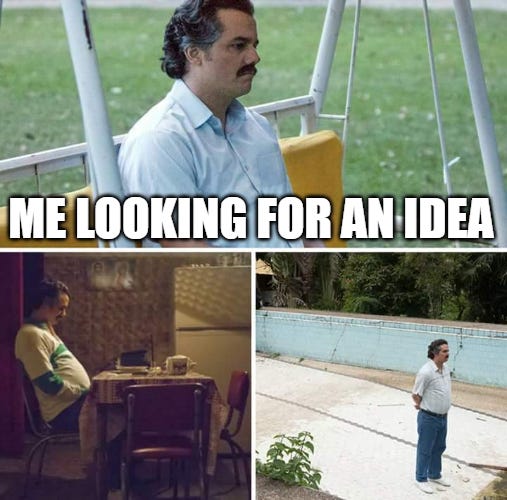
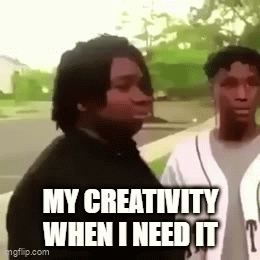
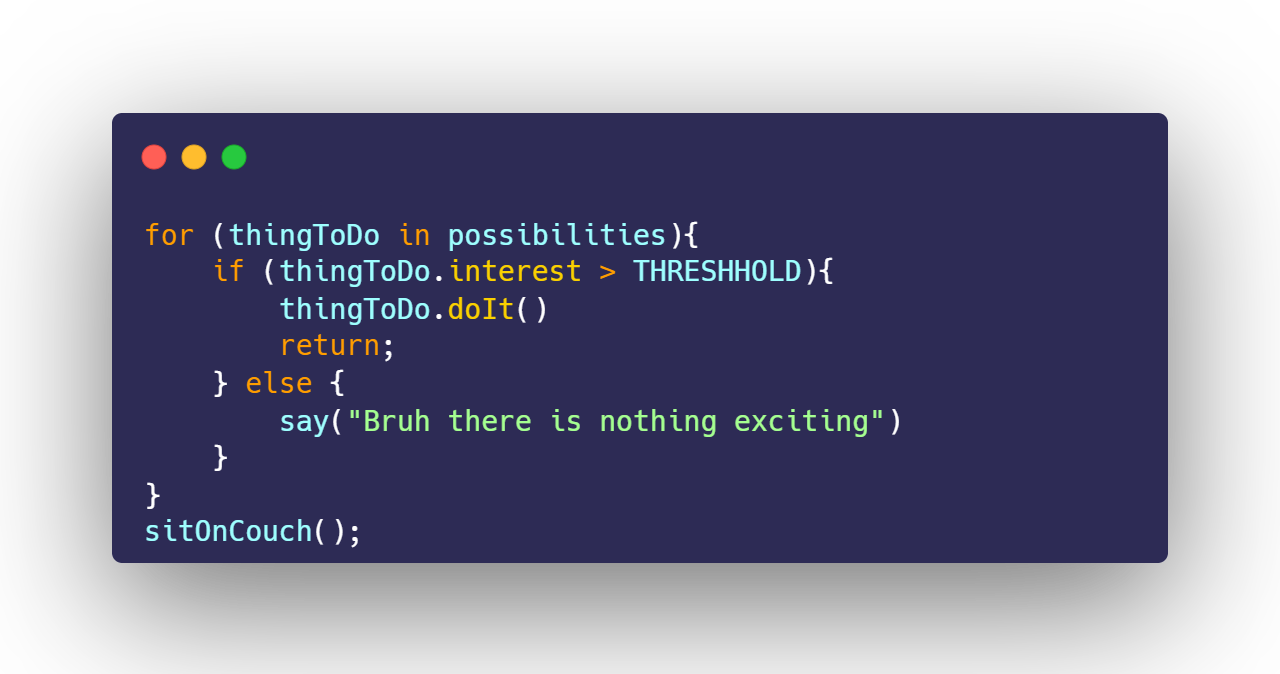
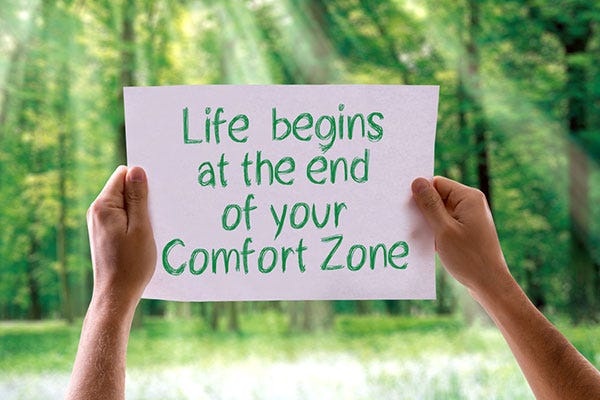
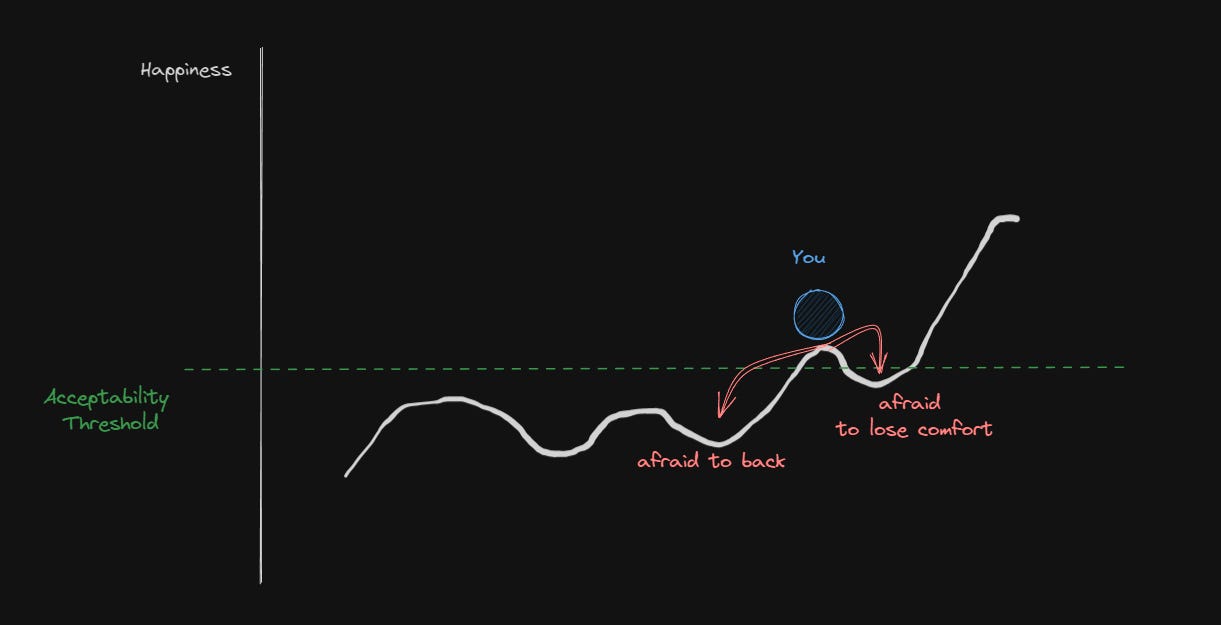
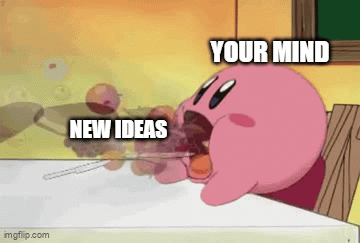
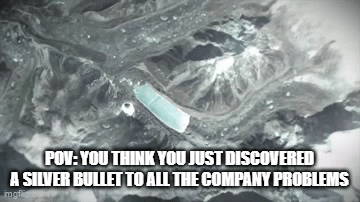
Amazon has this in their LPs as well: “constraints breed resourcefulness”. I like the part about “do nothing”. Playing video games or other activities that give us immediate gratification increases dopamine in our body. It is this satisfaction that keeps us in the comfort zone.
I allocate 3 hours of deep work and keep my phone in the other room. Thanks for putting this together.
There are definitely hundreds of different ways to get ideas.
There was a line, I think, in Make from Pieter Levels – and I tried to find it since it either got removed (or it was a different book) – the essence of it was: if you don't have ideas, just live a more exciting life.
Go into your yard and try to design a garden. It would be nice to have some AR to show you different ideas, right? Maybe a Garden as a Service where you just call people, and they make stuff happen.
To me, boredom comes when I'm out of ideas, then when I go for a walk or do something to get my mind going.
However, getting bored from doing a thing has another positive effect on me – and I embrace it. It means I've lost interest in something that probably wasn't all that interesting to begin with. As a comparison, I never lost interest in writing, and I can sit down and write at any given time.
Yet, I've killed many pet projects that I thought were big ideas.